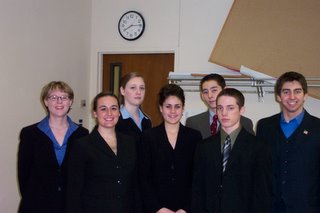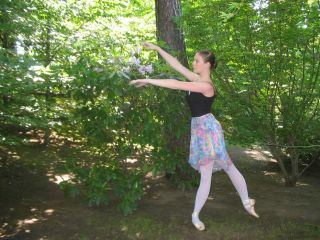~~~The Basics~~~
1. Name: Emmilee
2. Nicknames: "Emm" (which I despise and accept only from my closest friends) and Emmi (which I also despise but am forced to accept from my mother :)
3. Birthday: January 7, 1988
4. Place of Birth: Sacred Heart Hospital in Spokane
5. Zodiac Sign: I think Capricorn
6. Male or Female: Female
7. Grade: Senior in highschool, sophomore in college
8. School: Eastern Washington University (for another month...)
9. Occupation: Student
10. Residence: Home
11. Screen Name: elfchick, psyche, and em2ile2
~~~Your Appearance~~~
12. Hair Color: Used to be blonde, now a bit darker
13. Hair Length: About shoulder length, a little longer.
14. Eye color: Blue-green.
15. Weight: 135
16. Height: 5'10"
17. Braces?: Nope
18. Glasses?: No, but I think I need them.
19. Piercings: Just ears.
20. Tattoos: Um, no.
21. Righty or Lefty: Right (unfortunately- they say left-handed people are more artistic).
~~~Your 'Firsts'~~~
22. First best friend: BJ
23. First Award: Perfect attendance in 5th grade.
24. First Sport You Joined: None, really, unless you count ballet.
25. First pet: Never really had one, unless you count the family's dog, Rosy.
26. First Real Vacation: Minnesota and the Midwest at the age of 6.
27. First Concert: I don't ever remember going to a concert...
28. First Love: Non-existent.
~~~Favorites~~~
29. Movie: Lord of the Rings, Pirates of the Caribbean, The Patriot, Emma, The Bourne Identity, and A Beautiful Mind.
30. TV Show: I don't really watch TV.
31. Color: Various shades of green and blue.
32. Rapper: I rarely listen to rap so I don't really have a favorite.
33. Band: Did I mention I don't listen to much music?
34. Song Right Now: Track 16 from Hero soundtrack.
35. Friend: Too many to choose from.
36. Candy: Symphony and/or Reese's peanutbutter cups.
39. Favorite brand to wear: Whatever is inexpensive without being cheaply made.
40. Store: None. Anyplace that has what I want when I want it.
41. School Subject: Philosophy at the moment. Spanish is good too, but not right now.
42. Seafood: Disgusting!
43. Book: "The Mating Season" by P.G. Wodehouse, and also "Angels in the Architecture."
44. Magazine: World or St. Anne's audio magazine.
45. Shoes: Hmm, I need new ones...but out of the ones I have, probably my white heeled sandals, though they make me too tall.
~~~Currently~~~
46. Feeling: Tired and incompetent.
47. Single or Taken?: Single and proud of it!
48. Have a crush: Not at the moment, but someone else has one on me...*rrrrrr*
49. Eating: Not right now.
50. Drinking: Water, though it's coffee I need.
51. Typing: Obviously.
52. Online?: See previous answer. About 2 hrs a day.
53. Listening To: A pleasant mixture of Hero, Fellowship of the Ring, Pirates of the Caribbean, and Troy. No, I don't like soundtracks...
54. Thinking About: The looming deadlines I'm facing. And also a summer job.
55. Wanting To: Get something done and go to sleep.
56. Watching: Nothing, but I might catch Jeopardy! later tonight.
57. Wearing: My pajama pants because I felt in the dirt and tore my pants.
~~~Your Future~~~
58. Want Kids?: I suppose yes, but I think that's far away in the future.
59. Want to be Married?: Sure, why not.
60. Future Occupation: Who knows, maybe a lawyer?
61. Where do you want to live?: Anywhere, but most of all I want to travel.
62. Car: Anything with good gas mileage.
~~~Which is Better With The Opposite Sex~~~
63. Hair color: Preferably dark, though it doesn't matter much.
64. Hair length: Also not very important, so long as it's shorter than mine!
65. Eye color: Blue, green, or brown I guess. I really can't be picky.
66. Measurements: No me importa.
67. Cute or Sexy: Both are good.
68. Lips or Eyes: Definitely eyes.
69. Hugs or Kisses: Either works.
70. Short or Tall: Tall! At least 6 foot.
71. Easygoing or serious: Both, and knowing when each is appropriate.
#72: Missing. It was probably something inappropriate.
73. Fatty or Skinny: I suppose skinny is techinically better.
74. Sensitive or Loud: Again, both, but knowing when to use each one.
75. Hook-up or Relationship: Relationships are much stronger.
76. Sweet or Caring: Hah! He'd better be both!
77. Trouble Maker or Hesitant One: Trouble Makers are a lot more fun, besides, I need someone to balance my "serious" personality ;)
~~~Have you ever~~~
78. Kissed a Stranger: Not that I'm aware of.
79. Had Alcohol: Oh, most definitely.
80. Smoked: No.
81. Ran Away From Home: Yep, and spent about 6 hours out in the woods barefoot.
82. Broken a bone: Maybe a toe, but I've learned to ignore such trivial injuries, being a ballerina and all.
83. Got an X-ray: Of couse.
84. Been with someone: Hmmm, that could imply a whole lot more than I want it to, so no.
85. Broken Someone's Heart: I think not.
86. Broke Up With Someone: Um, no.
87. Cried When Someone Died: I think my grandpa was the only one.
88. Cried At School: Maybe when I was homeschooled, but definitely not in front of other people at a "real" school.
~~~Do You Believe In~~~
89. God: I should hope so.
90. Miracles: Yes.
91. Love At First sight: Possibly...I'd have to experience it to believe it.
92. Ghosts: Spirits, souls and the supernatural: yes.
93. Aliens: Yes, but only the illegal ones who come across the border from Mexico.
94. Soul Mates: Sure.
95. Heaven: Yes.
96. Hell: Yes
97. Angels: Affirmative, though not blonde ones with white dresses.
98. Kissing on The First Date: I would say no.
99. Horoscopes: Meaning whether they're true or not? Well, maybe seeing how ambiguous they are...but no, not really.










